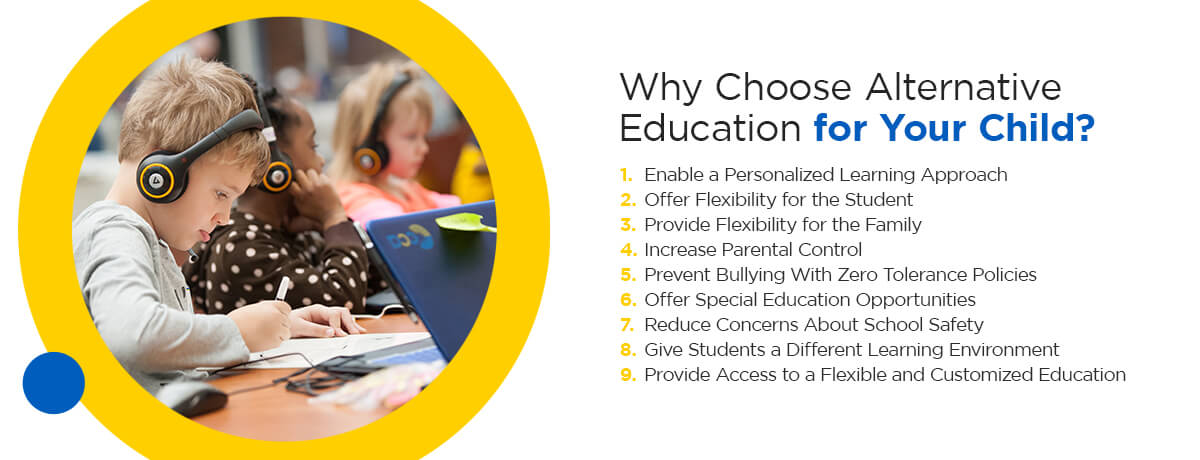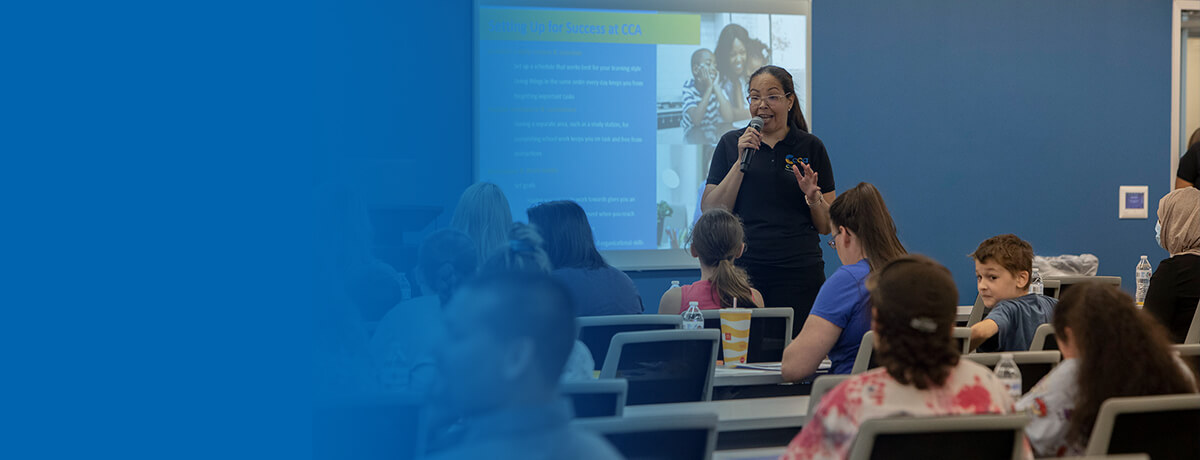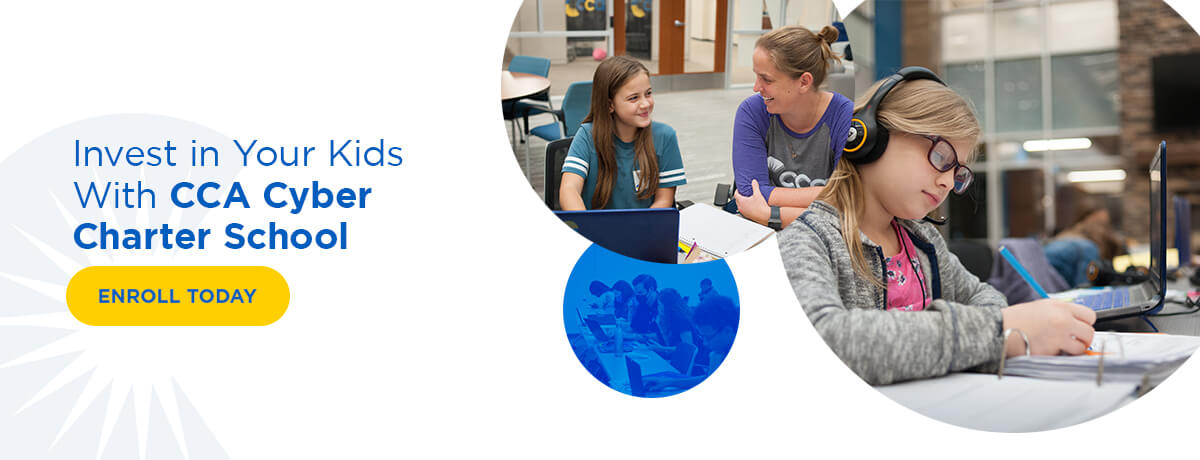We live in an age when everything is changing – everything, that is, except traditional public schools. While traditional schooling remains suitable for many families, too many parents are stuck in a time warp where education hasn’t caught up with the needs of their children.
Fortunately for families, the alternatives to traditional public schools are richer and more abundant than ever. The advent of the internet added cyber charter schools to the menu of alternatives to public school, such as charter, religious, and independent schools. Cyber charter schools bring tuition-free, high-quality learning directly to the home, where children are safe, and parents are in control.
Still, parents have questions. What are nontraditional schools? Here, we explain the choices facing parents who are determined to find a better way to educate their children.
6 Common Alternatives to Traditional Public School
What are nontraditional schools? There are many school choices. The options might seem intimidating, but the important thing is they offer hope to families who know in their hearts that their children deserve better. Whether a child needs to escape bullying, learn at a different pace, or pursue a passion on their own time, the right school can make all the difference.
1. Charter Schools
In essence, a charter school is a type of alternative school that is granted approval from state public education departments and local school districts to operate independently. These approvals are known as “charters,” extended to nonprofit organizations established to operate a school.
Charter schools must meet the same standards of accountability required of traditional public schools, but how they do that is up to them. They have the freedom to design curricula and deliver education that serve the distinct needs of their students and families.
Children who attend charter schools take all of the standardized tests that their traditional-school peers take, but their classroom days can look very different. For instance, lesson content might be more flexible, teachers might be more creative, or the letter grade system may be unique. Likewise, because they were created to address the demand by families for customized education solutions, many charter schools are designed to give parents and teachers a greater say in how schooling is delivered.
In Pennsylvania, charter schools are publicly funded through the same pool of taxpayer money that finances traditional school districts, so there are no additional costs to families to enroll their children in public charter schools.
2. Cyber Charter Schools
Like charter schools, cyber charter schools are allowed to operate by state public education departments. They are public and tuition-free, and they adhere to state standards while offering lessons through innovative means. However, these schools aren’t confined to brick-and-mortar settings. In fact, unlike brick-and-mortar charter schools, Pennsylvania cyber charter schools don’t need approval from local school districts to operate. Instead, they deliver high-quality, flexible schooling to families and children statewide.
In the digital age, cyber charter schools are flourishing as a viable alternative to traditional public schools. By harnessing technology, they are revolutionizing education programs and dispensing with the limitations of brick-and-mortar schools. It’s all designed according to the needs of families. Students might take live interactive online classes with teachers and classmates all sitting at their computers at the same time, or they might pursue customized studies on their own timelines, supervised by teachers. Many schools offer a blend of both to expand families’ options even more.
It’s important to know that cyber learning requires at-home involvement of parents, caregivers, and learning coaches, especially for younger children. Many parents worry that cyber learning would deprive their children of socialization opportunities, but most cyber charter schools offer a rich array of clubs and field trips. In Pennsylvania, state law also requires that local school districts open extracurricular activities to charter and cyber charter school students.
3. Magnet Schools
Some public school districts offer magnet schools that focus on a particular area of study. In these environments, students study core subjects but also delve deeply into their interests and talents, including the performing arts, languages, career and technical education, international studies, or STEM.
Before students are accepted, many magnet schools require an application and perhaps an audition. Magnet schools can serve children at any grade level, depending on how the schools are structured. As public schools they are tuition-free, but enrollment can be limited to children within the school district boundaries. Some magnet programs are so popular that acceptance is not guaranteed and families must submit to a lottery that awards enrollment.
4. Home Schooling
For decades, many parents have chosen to guide and direct their children’s education themselves. It’s a commitment driven by personal philosophy, religious beliefs, or limited options.
Although requirements vary by state, home-schooling doesn’t free parents from meeting state-designated educational standards. In Pennsylvania, for instance, the in-home teacher – usually a parent or caregiver – must hold a high school degree or equivalent. Portfolios of student work samples are submitted annually for review by a state-approved home education evaluator. Students must take required courses at certain grade levels, and they must take standardized tests in third, fifth, and eighth grades. Receiving a diploma requires meeting state graduation requirements.
Today’s home-school families are greatly aided by the cyber charter school movement. Although traditional, self-directed home schools remainan option, cyber learning lets parents remain involved but also offers support from state-certified teachers who are experts in alternative teaching methods and subject matters.
5. Religious Private Schools
Many different religious and faith-based communities, such as synagogues, churches, and mosques, have formed schools and education programs based on their beliefs. While these types of schools still provide traditional core subject matter, they generally combine them with the practices of their faith. This means that time for worship and faith lessons is implemented in the daily schedule. Usually, enrollment in faith-based schools is open to students and families outside the faith.
Religious private schools include parochial schools, which are associated with a specific faith community, such as a church. Private schools receive little or no public financial support, which frees them from many of the regulations imposed on public schools. Their funding is usually derived from the supporting faith group and from tuition fees. Tuition can vary, and some families might have access to scholarships.
6. Boarding and Independent Schools
While some people assume that most private schools are faith-based, this is not the case. There are many private school options that are not affiliated with a specific religion, such as independent and boarding schools. These types of schools often come with certain distinctions in terms of their educational levels. Some may offer innovative learning methods outside the constraints of a traditional classroom, while others allow students to pursue international baccalaureate degrees.
Generally, independent and boarding schools are overseen by a board of trustees or governors that decide the school’s educational philosophy, curriculum, and extracurricular activities and offerings. These schools can be single-sex or coed, and families can choose between a day school or a boarding school where their child can live there during the school week to immerse themselves in the academic culture.
Like their religious counterparts, independent schools usually charge tuition and might have scholarships available.

Why Choose Alternative Education for Your Child?
How does a parent or caregiver know when an alternative learning school is the right choice? It’s a difficult decision but one that must be made in the best interests of the child. It’s always the right time to consider the benefits that a nontraditional school offers.
1. Enable a Personalized Learning Approach
Whether it’s additional support for subjects in which your child struggles or challenging coursework for the gifted student, nontraditional schools go the extra mile to meet your child’s unique needs by offering personalized education programs. By seeking out alternative education for your child, you can be confident that they will be taught using a personalized approach.
Teachers in nontraditional school settings, such as online learning, recognize that every child learns differently, so they will work with your child and your family to tailor the curriculum to their interests, needs, and preferred learning methods.
2. Offer Flexibility for the Student
One of the most significant benefits of alternative education is the flexibility it offers for your child. Traditional schools tend to follow the same lesson content and curriculum for every student. Because all children learn differently and at their own pace, it can be difficult for your child if they are not on the same page as everyone else.
Perhaps the pace of your child’s current school type is too fast or too slow. Maybe your child struggles to keep up with schoolwork while playing sports or training in dance, music, or drama. Maybe it’s challenging for them to focus in a classroom setting with a bunch of other kids because they get easily distracted. Your child deserves the chance to make it all work to suit their needs.
With alternative schooling, such as online learning, you and your child’s teacher can create a pace and schedule that challenges your child to grow academically but is also delivered in a way that engages them in their studies.
3. Provide Flexibility for the Family
In addition to giving your child more freedom to adjust their education and schedule with alternative school, the rest of your family can also benefit from this flexibility. Parents and caregivers juggle a variety of obligations to their employers, military service, community, churches, and relatives. None should be an afterthought to school. Many nontraditional schools give families the agility to work, travel, and care for loved ones while keeping pace with their children’s education.
This means you don’t have to sacrifice important family matters or choose between caring for a loved one and making sure your child makes it to school on time. With online education, your family can eliminate much of the stress that comes with balancing schedules and priorities.
4. Increase Parental Control
Many forms of nontraditional schooling demand extra effort from parents, but it’s a commitment they’re willing to make. Parents of nontraditional school students know what their children are learning every day. When children are learning from home, such as with online education, parents get peace of mind from knowing that their child is safe.
Learning from home also helps parents whose children have learning disabilities or conditions that make it a bit more challenging to focus in a traditional setting. With online education, students get more one-on-one assistance from teachers than in a traditional classroom, which means parents can be actively present in their child’s education success story. This type of alternative to public school also makes it easier for parents to ensure that their child is staying on task instead of being distracted by their peers.
5. Prevent Bullying With Zero Tolerance Policies
Too few traditional public schools take bullying seriously enough. And yet studies show that bullying and cyberbullying hinder academic achievement and diminish students’ self-confidence for life. Many alternative schools see a large number of children escaping the horrors of bullying at their former schools, so they treat it as a serious matter. Zero-tolerance policies help children heal from the effects of bullying and stamp out bullying at the first sign.
If your child has been bullied in the past at public school, it can cause anxiety, stress, and low self-confidence. Some students may even try to get out of going to school or pretend they are sick so they can avoid seeing their unkind classmates. By transferring your child to a cyberschool, they can escape the daily reminders of bullying and the social pressures of conformity, making it easier to build friendships of their choosing and focus on their academic performance.
6. Offer Special Education Opportunities
Families shouldn’t have to fight to get high-quality education for learners with special needs. In a traditional setting, your special education program options may be very limited or fail to cater to your child’s unique needs, which can make it difficult for them to succeed. Nontraditional alternatives to public schools can customize learning and empower parents to remain involved as their child grows in capabilities.
Cyber charter schools offer the advantage of special education learning from home, in safe environments where students are comfortable and parents are assured that their child’s well-being is secure.
7. Reduce Concerns About School Safety
Surveys show that parents worry more than ever about the safety of their children at school. Due to parent and staff concerns, many schools report that they plan to increase student mental health services for more conditions, such as depression, anxiety, and trauma.
Students themselves may even recognize that appropriate mental health services can steer their classmates away from violence. Plus, from their vantage point, the daily disruptions of bullying and fighting make the school atmosphere unfavorable for learning and developing healthy social relationships.
However, many parents are still concerned as policymakers and educators responsible for making fundamental reforms fall short of their expectations. Whether through misconceptions or lack of funding, traditional schools simply haven’t done enough. That leaves families to fret over the safety of their children, while students are forced to endure anxiety instead of enjoying learning.
8. Give Students a Different Learning Environment
Gray walls. Long rows of desks. Cookie-cutter lesson content. Bells ringing to signal the march to the next class. Today’s children didn’t sign up for delivery of education that hasn’t changed in 100 years. As studies show, but traditional educators rarely acknowledge, the most effective learning environments are dynamic and student-focused.
These alternatives also accommodate the schedules and unique circumstances of each family. Too often, household daily routines just don’t mesh with school schedules, cramping the ability of children to learn at their own pace and to engage in imaginative learning. Many nontraditional schools don’t demand that families adapt to them. They go the other way – designing their systems to suit the needs of families and students.
9. Provide Access to a Flexible and Customized Education
Children learn differently, through reading/writing, listening, hands-on work, or discussion. If a child’s learning style isn’t accommodated, they can fall behind academically, out of frustration, or inability to grasp new concepts simply because they’re taught in the wrong way.
Alternatives to public schools have the flexibility and the commitment to get to know each student personally. They can create learning environments that are supportive and challenging – for instance, supporting students who might need a little more encouragement to join class discussions, while challenging them to broaden their understanding of new concepts. Children who need more time can learn at their own pace. Gifted children who need stimulation to avoid boredom can get advanced coursework that sparks intellectual curiosity.
Many alternative schools also are keenly aware that schools aren’t siloes separated from the real world. Children need to know what all their learning is going to accomplish. When they are introduced to career possibilities from an early age and guided along learning paths that develop their unique talents and interests, they are prepared for life after graduation, whether that leads to college, career training, military service, or the workforce.
Invest in Your Kids With CCA Cyber Charter School
Your children change. They live in a very different time than the era when you grew up. Why hasn’t their school kept pace? The digital age brings flexible, customized schooling directly to families, in the form of cyber charter learning delivered in the comfort and safety of their homes.
Parents unhappy with their children’s current schools don’t have to put up with the unacceptable. Kids of all abilities deserve schooling that unleashes their full potential. They deserve learning opportunities that are fun and engaging. They deserve to spend their days in safety, free from violence and bullies. They deserve the chance to pursue their passions. Reach out to our team to find out why our schooling alternative is ideal for you, or enroll today.




